
In India’s fast-changing youth culture, a new kind of nightlife is quietly taking over, and it has nothing to do with alcohol, loud bars, or late-night chaos. Instead, it is driven by devotion, music, and an unexpected blend of spirituality and fun. This rising trend, known as bhajan clubbing, is capturing the imagination of Gen Z and slowly reshaping how they connect with culture, faith, and community.
View this post on Instagram
A New Kind Of Nightlife For Young India
Bhajan clubbing brings together traditional devotional songs and high-energy soundscapes, creating an atmosphere that feels festive yet grounding. These gatherings mimic the vibe of a club, dim lights, immersive music, and collective dancing, except the playlist is filled with chants and bhajans.
For many young people, this shift represents a refreshing alternative to the usual party scene. Instead of loud chaos, these events offer meaning. Instead of intoxication, they offer emotional depth. And instead of disconnect, they build community.
The appeal is simple: it lets youth celebrate without stepping away from their roots.
Why Gen Z Is Embracing The Movement
Spiritual Rebellion
This is not the kind of rebellion associated with breaking rules. It’s about breaking patterns. Gen Z is turning away from the Western club culture that long shaped urban nightlife, choosing instead a form of celebration that feels soulful and personal.
Cultural Pride
Bhajan clubbing gives traditional music a fresh identity. By mixing devotional songs with modern beats, young Indians get to reconnect with rituals they may have grown up with, but in a way that feels stylish, relatable, and uniquely theirs.
Community Without Distractions
These gatherings are alcohol-free and drug-free. What they offer instead is connection. People sing together, dance barefoot, and share a rare kind of collective joy that feels both calming and uplifting.
The Viral Spark That Ignited A Movement
The trend existed in pockets earlier, but it truly took off after a viral video by content creators Backstage Siblings, Prachi and Raghav Agarwal, began circulating online. Known for their intimate “Baithaks,” the duo performed a modern, melodic version of 'Shri Krishna Govind Hare Murari.'
View this post on Instagram
The crowd’s reaction was electric. Hundreds joined in, many recording the moment on their phones as their voices rose with the music. Within days, the clip was everywhere, Instagram, YouTube, WhatsApp groups, and it struck a chord with young listeners.
Soon, similar gatherings started appearing across India’s major cities. Some called them 'spiritual raves,' others 'soul circles.' But regardless of the name, the idea was the same: devotion, music, and shared energy.
A Cultural Shift With Global Potential
What started as a small, experimental format is now transforming into a movement that speaks to a generation searching for balance. It blends devotion with dance, tradition with today, and introspection with celebration.
-
Orry summoned by Mumbai police in Rs. 252 crore drug case

-
'Hara hachi bu': The Japanese philosophy of eating until you're 80% full goes beyond weight loss

-
Man Utd star devastated and speaks out on Scott McTominay - 'We have enough good players'

-
Book excerpt: Piyush Mishra resorts to desperate measures to earn a writing credit on a film

-
Priyanshu Painyuli on 'Tere Ishk Mein': Felt instinctive, almost as if the film chose its own people
